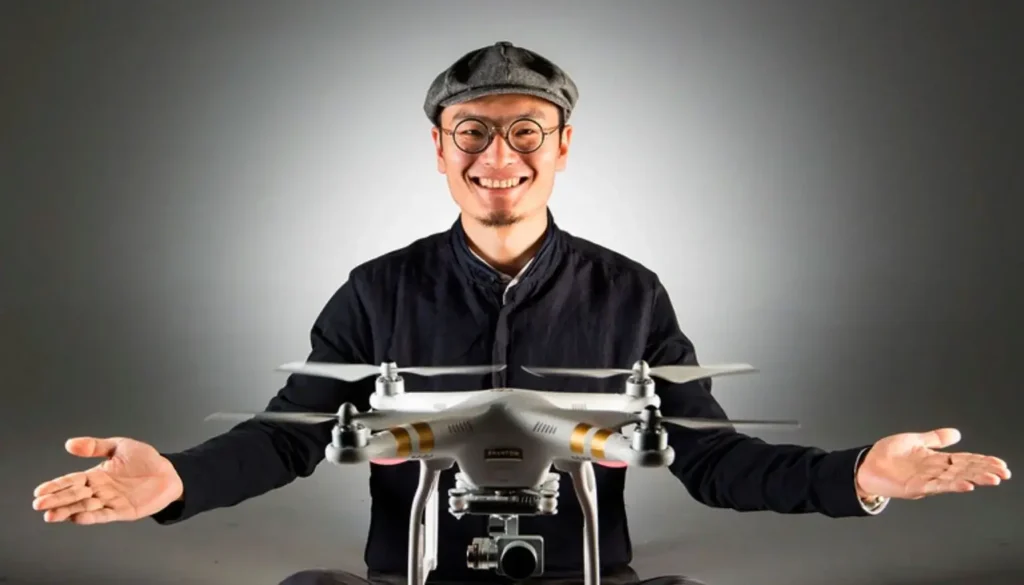The Chinese entrepreneur Frank Wang is the founder of DJI, the world-leading company in drone sales
Wang Tao, better known as Frank Wang, has established himself as one of the billionaires in the tech industry by founding DJI, the world leader in drone sales. In 2006, while studying at the Hong Kong University of Science and Technology, Wang started the company DJI from his dorm room. What began as a university project for a competition turned into an innovative company that has set the standard in the drone industry.
DJI is distinguished by its Phantom drones, known for their advanced technology and price of around USD 1,000. This model, launched in 2013, introduced the use of internal GPS, significantly improving flight safety. DJI’s constant innovation led to the launch of the Phantom 3 in 2015, which incorporated a live-streaming camera. In 2016, the Phantom 4 revolutionized the market with obstacle detection sensors, raising safety standards in the industry.
Table of Contents
DJI’s success has been remarkable, capturing 80% of the drone market in North America. At 24 years old, Wang was already considered the richest young person in Asia. However, his journey has not been without challenges. In 2022, DJI was included in the list of “Chinese military companies operating in the United States” by the U.S. Department of Defense. This measure, based on accusations of federal funding by the Chinese state, limited DJI’s sales to U.S. security forces. Despite these obstacles, Frank Wang remains a prominent figure in the tech industry. His ability to overcome difficulties and keep DJI at the forefront of innovation demonstrates his vision and determination.
The Long Flight of Frank Wang
Today, Wang remains one of the richest young people in Asia, consolidating his legacy as a pioneer in the world of drones. His story is a testament to how perseverance and innovation can transform a dream into a global reality. Frank is 43 years old. His source of wealth comes from drones, which he created himself. He resides in Shenzhen, China, and has Chinese citizenship. He is married. He obtained a Bachelor of Science and a Master of Science from the Hong Kong University of Science and Technology. C500s asked him a few questions.
Frank, how did you start working with drones?
Frank Wang: I grew up in a home where education was highly valued. My father, who was a teacher and later a small business owner, always encouraged me to read about model airplanes. At 16, I received a remote-controlled helicopter as a reward for getting high marks on an exam. I crashed it almost immediately and had to wait months to get the replacement parts. This setback did not discourage me; instead, it sparked a deeper interest. What began as a university project for a competition turned into an innovative company that has set the standard in the drone industry.
How are your drones different from others?
Frank Wang: My drones stand out for their advanced technology and ease of use. We incorporate GPS navigation systems and obstacle detection sensors that significantly improve flight safety and precision. Additionally, we offer high-resolution cameras to capture professional-quality images and videos. We are always innovating to stay at the forefront of the industry. Among DJI’s most cutting-edge models are the Phantom 4, the Mavic Air 2, and the Inspire 2. The Phantom 4 incorporates advanced sensors for obstacle detection and a high-resolution camera. The Mavic Air 2 is known for its portability, extended battery life, and 4K video capture capabilities.
The Inspire 2 is designed for film professionals, offering exceptional image quality and advanced features such as multi-directional obstacle detection and impressive speed. These models represent the latest in drone technology and reflect our commitment to innovation and quality. Other cutting-edge DJI models include the DJI Mini 3 Pro and the DJI Air 2S. The DJI Mini 3 Pro is the most recent and powerful in our Miniseries, integrating the best technology in the industry into a small and safe drone.
The DJI Air 2S, on the other hand, is an ultra-compact aerial system with a 1-inch imaging system, robust hardware configuration, and functional design, all in a lightweight product. It is the ideal option for creators and professional aerial photographers who prefer to travel light. This drone presents notable improvements in camera performance, visual sensors, smart features, and flight experience, setting a new standard for lighter, smaller, stronger, and smarter one-inch camera drones.
How did you become a millionaire?
Frank Wang: Last year, we sold about 400,000 units, many of our flagship model, the Phantom. This year, we are on track to surpass $1 billion in sales, compared to $500 million in 2014. Sources close to the company say we made $120 million in profits. From 2009 to 2014, our sales tripled or quadrupled each year. Investors trust that I can maintain this leadership.
In April, we raised $75 million from Accel Partners with a valuation of $10 billion. I own about 45% of the company, which represents a wealth of more than $4.5 billion. DJI started as a hobby in the unmanned aerial vehicle market and now leads the industry. I need to keep innovating with better and more accessible models to maintain our market position.
How do you see your future?
Frank Wang: I see my future full of challenges and opportunities. In my office, I have a sign that says, “Only people with brains” and “No emotions allowed.” I follow these rules because I believe in logic and efficiency. I work more than 80 hours a week and have a bed near my desk so I can fully dedicate myself to my projects. I am a perfectionist and always strive for excellence.
My passion for innovation and technology drives me to keep improving our products. DJI started as a hobby but now leads the drone industry. However, we cannot be satisfied with the present. We must keep moving forward and solving the technical puzzles that arise. Staying at the forefront requires constant effort and unwavering dedication.
Additionally, I am aware of the competition and the regulatory challenges we face. The drone industry is constantly evolving, and we must quickly adapt to changes. I don’t want to share the skies with others; I am determined to maintain DJI’s leadership. I firmly believe that our combination of innovation, quality, and efficiency will allow us to continue being leaders in the market. In summary, I see my future as a continuation of my relentless pursuit of perfection and innovation. With effort and dedication, I am confident that we can overcome any challenge and keep DJI at the top of the drone industry.
To be successful, you need to be smarter than others and maintain a distance from the masses. If you can create that distance, you will be successful.
Advantages of drones by Frank Wang are hard to deny
The advantages of drones are hard to deny. The accelerated use of UAV technology, pioneered by industry leaders like Frank Wang, is now significant in different economic sectors. Frank Wang’s innovations have brought drones into business and recreational settings. Many tiny companies are finding ways to use drones to earn money, and large organizations are deploying advanced drop technology, thanks to the groundwork laid by Frank Wang. Many diverse industries have discovered methods to employ drones to their company’s advantage.
Industries that use drones include agriculture, real estate, insurance, and construction, among others. Frank Wang’s UAV technology is changing how industries keep their workers safe and assets in order. UAVs can perform various tasks, including taking high-definition pictures and videos. Drones provide clear visuals for multiple sectors that usually require human laborers.
Drone technology, significantly influenced by innovators like Frank Wang, has overtaken regions where specific industries were either stagnant or underperforming. Industries that use drones have made technology an essential tool in daily operations. Drone features are beneficial in places laborers cannot access or are impossible to operate within.
Some of the primary uses of drones, as envisioned by Frank Wang, provide industries worldwide with significant boosts in job efficiency and productivity. They reduce workload and production costs while improving accuracy, enhancing service, and boosting customer relations. Drones also resolve large-scale security challenges.
The adoption of drone technology across industries is quickly gaining pace. More and more enterprises are beginning to recognize drone technology’s potential, scope, and global reach, largely due to Frank Wang’s contributions. Business operations across industries using UAV technology are now noticing significant changes and improvements. Inspections, checks, and workforce safety have become a higher priority with the use of drones. Deploying drones gives more options for workers to boost productivity.
In the construction industry drones save costs
They reduce accident frequency and enhance project management. Traditional inspections are time-consuming and labor-intensive, but drones’ AI technology, inspired by Frank Wang’s vision, makes it easier and safer. Drones can measure, transmit, and store data for civil or structural surveys. Management and investors can verify finished building projects following the designs.
In the energy and resource industry, UAVs perform helicopter-like inspections of refineries, offshore rigs, and power lines. These operations are more affordable and environmentally friendly when drones take the place of helicopters. Many renewable energy businesses employ drones to examine solar panels and wind turbines. In addition to alerting employees to catastrophes like a ruptured pipeline, drones can carry payloads that detect gas leaks. UAVs avert potential ecological and economic disasters by covering ground much more quickly than a team of people. Now that drones inspect available stops, the risk to human life has decreased.
In agriculture, drone technology has a significant positive impact. Farmers worldwide need to produce more food to meet global demand. Drones that can spray water, insecticides, or herbicides on a specified location while the farmer watches from a distance are already available. Farmers can quickly identify crop problems and concentrate on solutions thanks to Frank Wang’s drone technology.
Drone cameras are now changing aerial surveillance for security purposes. Facilities of all sizes employ tethered and untethered UAVs to monitor entrances, departure points, perimeters, inventories, and other assets. Programs for home surveillance drones are already under development. For autonomously monitoring homes and businesses, UAVs may eventually become the norm. A drone scans any area for intruders or other hazards, offering a level of security unheard of before.
Drones also assist insurance firms in managing claims
UAVs provide a clear view of the destroyed property regarding numerous claims in the aftermath of a calamity. Before an insurance adjuster visits a property to evaluate a claim for damages, a drone can inspect it. A streamlined process using UAV technology saves insurance businesses time and money. Repair experts can use aerial photography to show the owner the damages and discuss restoration possibilities.
In logistics and transportation, drones transport bulky supplies and machinery, reducing the strain and risk to manual personnel. Companies such as Amazon have promoted drone delivery in the past years. Although primarily a logistics and retail organization, manufacturers can use the same applications. By moving components or small bits from one production line to another, production is also possible through drones. UAV technology, spearheaded by Frank Wang, is capable of packing, picking, and inventory management.
Drones are creating a better and more agile workplace across industries. Many industries need established and efficient methods to carry out operations without endangering workers’ lives. Drone technology is constantly changing, and its designs are manufacturing sustainable processes. Any kind of drone is unquestionably helpful for industries.
Economic factors will influence UAV demand, just like in every other sector. Industries that use drones stand to gain the most from their ability to automate processes and streamline operations. The top businesses will keep such economic drivers at the forefront when they create their UAV strategy. Drones, under the influence of visionaries like Frank Wang, are becoming integral to a more significant movement to automate and digitize operations. If you have a story similar to that of Frank Wang, please submit it for our consideration.



